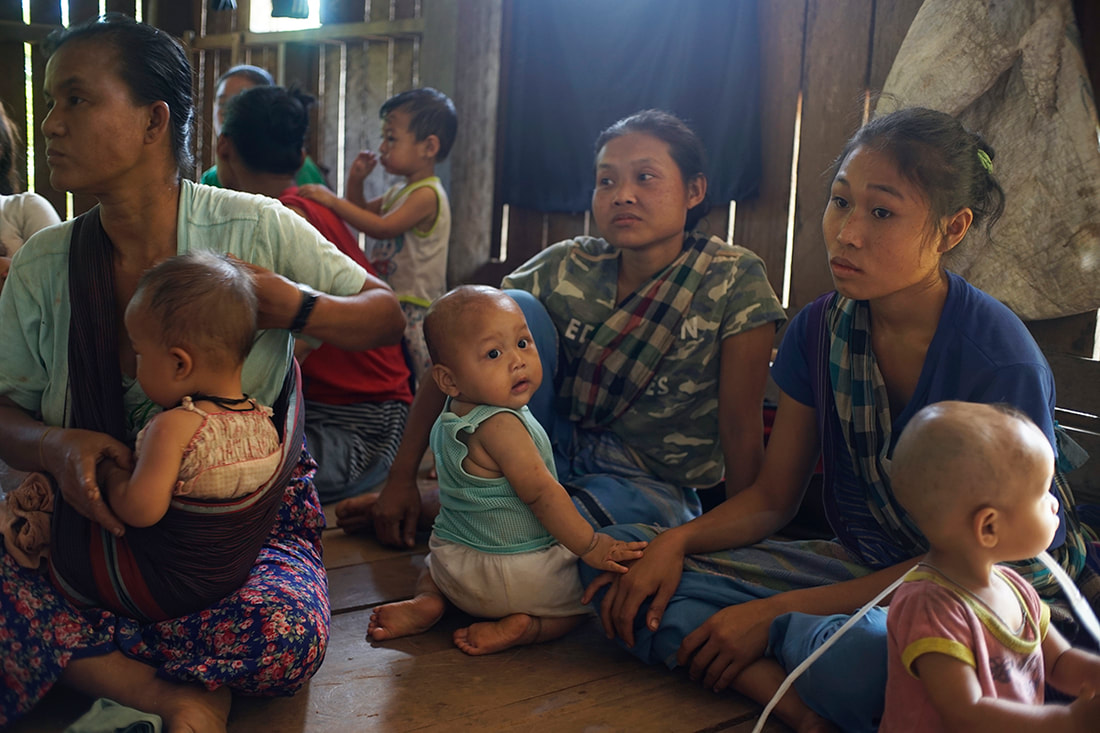|
Despite significant progress in recent years, Myanmar continues to face many challenges to ensure that children thrive. Community Partners International (CPI) is supporting a cooperative initiative between the Government of Myanmar and the Karen Ethnic Health Organizations Consortium to use cash transfers to boost the health of children in the first 1,000 days of life in contested areas of Kayin (Karen) State. World Bank data for 2017 shows that one in 20 children in Myanmar does not live to see their fifth birthday[1]. One in eight babies is born premature[2], with maternal identified undernutrition a key cause of premature birth. And around one in every three children under five years of age is affected by stunting, (rising as high as one in two in some states and regions). Caused by chronic undernutrition, stunting is defined as having a lower than average height for a child’s age. However, the impact of stunting reaches far beyond height - it can significantly impair a child’s brain function, organ development and immune system, and limit their life opportunities.
As part of the National Social Protection Strategy, Government of Myanmar launched a maternal and child health cash transfer program in 2014 to help address stunting and under five mortality. Under this program, implemented in part by the Department of Social Welfare (DoSW) of the Ministry of Social Welfare Relief and Resettlement (MSWRR), unconditional payments of 15,000 Myanmar Kyat (approximately US$10 at the time of writing) are provided each month to all women during the last six months of pregnancy and the first two years of their child’s life. The program hopes to reach more than two million beneficiaries by 2024. The cash transfer program initially focused on Chin State, Rakhine State, where levels stunting among children are high at 41% and 38% respectively[3], and the Naga Self-Administered Zone. For 2018 and 2019, the Government of Myanmar approved a budget to extend the program to Kayin and Kayah States, where levels of stunting among children are 40% and 25% respectively[4]. For Kayin State, in addition to the urgent need to address stunting and under five mortality, the extension of the cash transfer program provides opportunities for cooperation between government and ethnic nationality organizations which can contribute positively to ongoing peace process initiatives. In October 2018, with CPI’s facilitation and support, the DoSW initiated the roll-out of the cash transfer program in mixed administration areas Kayin State where ethnic and community-based health organizations play an important role in health service provision to conflict-affected and remote communities. Under this initiative DoSW and the Karen Ethnic Health Organizations Consortium (KEHOC) are cooperating to extend cash transfers to eligible women in 450 villages. CPI is helping to coordinate workshops conducted by DoSW to train KEHOC health workers in the policies and procedures necessary to implement the cash transfer program in their communities. This will include the formation of village level committees to oversee the cash transfers. KEHOC health workers will begin registering pregnant women and women with children under two years of age from December 1 to 15, 2018, and the first cash payments will be distributed in January 2019. The funds will be directly transferred from DoSW to KEHOC, who will the manage the cash distribution in the villages covered by their health service networks. CPI will continue to facilitate coordination between DoSW and KEHOC, and will support KEHOC to manage the cash distribution process in 2019. [1] World Bank Data: https://data.worldbank.org/indicator/SH.DYN.MORT?locations=MM&year_high_desc=true accessed on December 4, 2018 [2] Born Too Soon - The Global Action Report on Preterm Birth, World Health Organization, 2012: http://www.who.int/pmnch/media/news/2012/201204_borntoosoon-report.pdf [3] Myanmar Ministry of Health and Sports Demographic and Health Survey, 2015-2016: https://dhsprogram.com/pubs/pdf/SR235/SR235.pdf [4] Ibid Comments are closed.
|
AuthorCPI Admin Archives
July 2024
Categories
All
|
|
|
COMMUNITY PARTNERS INTERNATIONAL
580 California St Fl 16, Ste 1658, San Francisco, CA 94104-1068, USA [email protected] +1 510 225 9676 We are a registered nonprofit 501(c)(3) Public Charity. TAX ID 94-3375666 |
©
Community Partners International


 RSS Feed
RSS Feed
